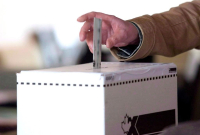Support strong Canadian climate journalism for 2025
A bill aimed at protecting Canadians from foreign attempts to influence how they vote is facing criticism that it's too weak to do the job.
But Democratic Institutions Minister Karina Gould defended Bill C-76 on Wednesday, arguing it's just one means of deterring foreign interference in Canadian elections.
Should a foreign entity attempt something on the scale of Russia's bid to manipulate the results of the 2016 American presidential election, Gould said that would be considered a matter of national security and the "full breadth" of tools available to the federal government would be applied.
She indicated those tools would include sanctions, the Criminal Code and the Magnitsky Act, which empowers the government to freeze the assets and impose travel bans on corrupt foreign officials who have committed gross violations of internationally recognized human rights.
"We are trying to do what we can within the Elections Act to limit the ability of foreign actors to interfere in our elections and to deter any collusion between foreign actors and Canadians but we still have the whole tool kit of the government available to us," Gould told the Senate's legal and constitutional affairs committee, which is studying the bill.
"It would become an issue of national security if it was on the same scale as in the United States and I think we would act accordingly."
However, some senators did not appear convinced.
Liberal independent Sen. Serge Joyal, the chair of the committee, expressed disappointment that the bill does not include a recommendation made unanimously by his committee last year: that election laws include "strong prohibition and sufficient penal consequences to deter" foreign interference, including seizure and forfeiture of the assets of any foreign entity that attempts to influence a Canadian election.
"The administrative penalties that are included in C-76 won't deter Russia or any other country to intervene in our election," Joyal said.
"We have to give a very strong signal and this signal is not, unfortunately, in the bill."
The bill would prohibit third parties from using foreign money to fund partisan activities, with penalties of up to five times the amount of foreign money used.
But Conservative Sen. Claude Carignan expressed doubt that the bill will prevent foreign entities from using social media to spread fake news designed to influence the outcome of an election, exploit societal divisions or sow chaos aimed undermining public trust in the electoral system.
Gould acknowledged that it may well be impossible to prevent all foreign interference in elections.
Still, she argued that the bill WILL help by requiring social media platforms to keep a registry disclosing who is spending money — and how much they're spending — on online political advertising.
It would also undo the most controversial elements of the previous Conservative government's so-called Fair Elections Act — which evidently doesn't sit well with some Conservatives senators.
Sen. Denise Batters criticized the bill for restoring the ability to use what she called "error-filled" voter information cards to prove residency and restoring the ability of an individual to vouch for someone without proper ID. That could result in someone voting "with no actual identification — only an information card which may have been printed and sent by Elections Canada in error," she argued.
Gould countered that there is no evidence of widespread voter fraud in Canada and that it's more important to ensure that the most vulnerable Canadians — the elderly, Indigenous people and young people, who are most likely not to have ID with proof of residency — aren't disenfranchised.
Batters also criticized the bill for allowing the commissioner of elections, who enforces election laws and investigates violations, to once again operate under the auspices of Elections Canada, the independent agency that administers the law. She suggested that would create a conflict of interest if, "in the worst case scenario," the chief electoral officer were to commit an offence.
"Wouldn't that really be the chief electoral officer investigating himself, deciding not to compel himself (to testify) and prosecuting himself?" Batters said, referring to the commissioner as an "employee" of Elections Canada.
Gould pointed out that bill specifically spells out that the commissioner is independent of the chief electoral officer.




Comments
Given the story about the "Ontario Proud" third party that also appeared i today's edition it is not just the "foreign" powers we have toworry about - it is the fifth comummnists within our own society who are happy to use whatever means necessary to gian advantage. At the risk of being an "anti=free speecher" I''m inclined to think there must be some way to prevent the opportunists, the power grabbers from unduly influencing voting.
Apparently, the relaxing of campaign finance laws is the biggest factor in the growing chaos of electoral "information." I feel strongly that only those who are actual candidates, who have "skin in the game" should be allowed to raise funds - (under tight controls) for their campaigns. Third parties probably cannot be barred from expressing their opinions but they should not be able to spend vast amounts of money to amplify their views. Moreover any supporter or opponent should be limited to commenting only on the candidates in the electoral district in which they will vote.
It is essential to get some balance back into political campaigns so that the 0.05% of the super rich cannot through their money around in any but their own district.